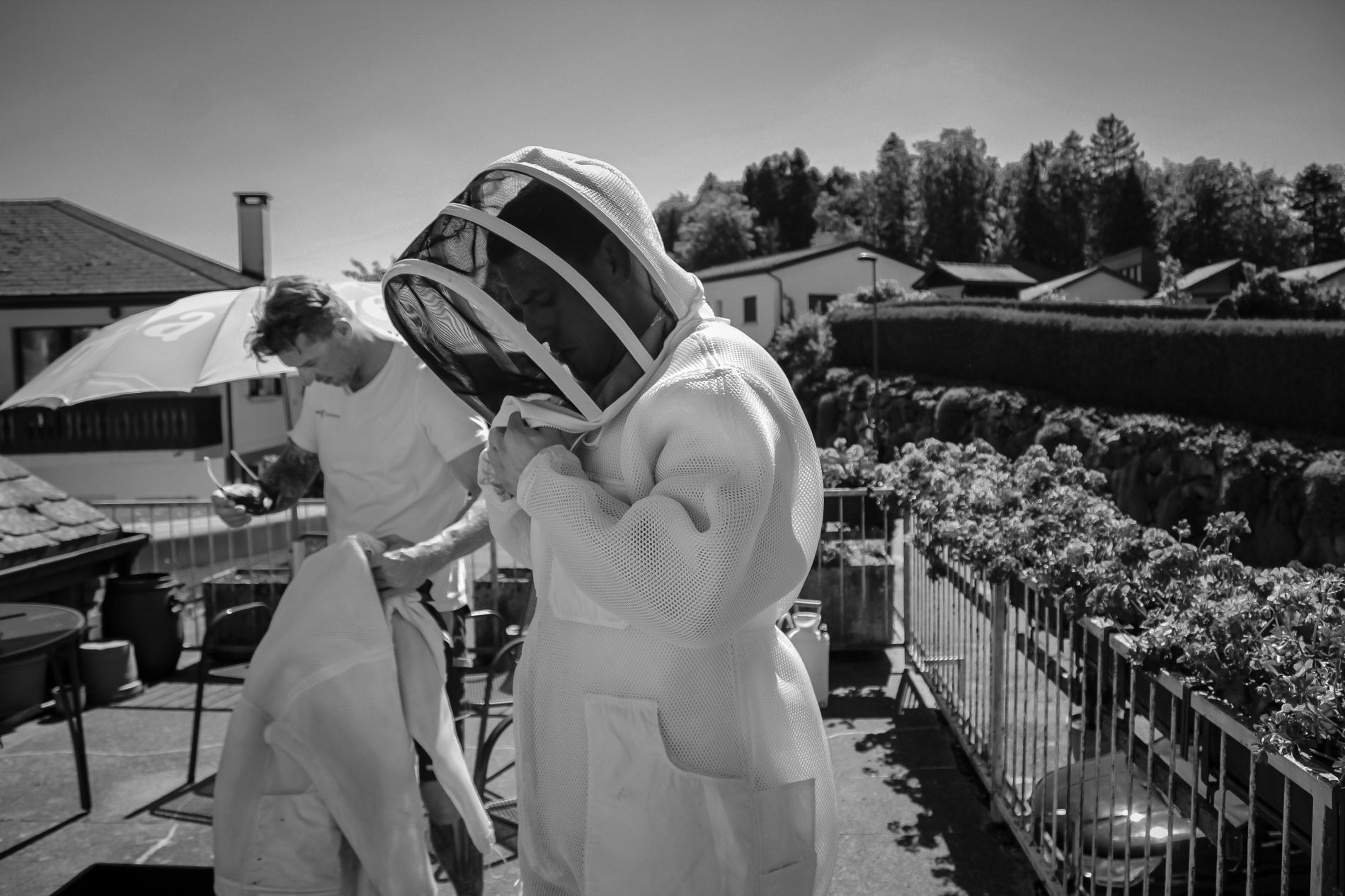
Fighting Asian hornets in Grüsch
Have you discovered an Asian hornet's nest? We'll be on site quickly! Call now - Daily Mon-Sun 07:00-21:30. Contact us now: 058 510 22 54
Having the Asian hornet's nest removed
Vespa velutina, a hornet species from South-East Asia, has aggressively invaded Switzerland and the entire subcontinent, sparking panic among beekeepers due to its predatory behavior towards honey bees. Although not hostile to humans, just a few of these hornets can swiftly attack and annihilate an entire bee colony within mere hours. If you have discovered a hornet's nest on your house, patio, shed, or in your blind box, contact our experts for hornet nest removal in Grüsch!
Use the uncomplicated telephone service of the Hornet experts in Grüsch and simply inform us at 058 510 22 54, we will be on site quickly so that you and everyone in your area feel completely safe again.
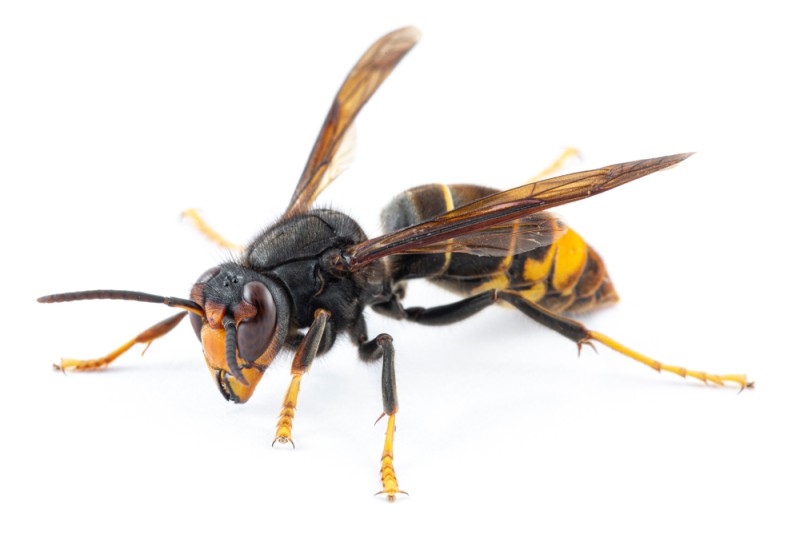

Appearance of the Asian hornet
Here are some characteristics that distinguish the Asian hornet:
1. Size: The queen can reach a length of about 3 cm, while the workers are slightly smaller and measure about 2.5 cm.
2. Color: The Asian hornet has a dark body that is almost black, with a yellow stripe at the back of the abdomen. Its face is orange-yellow.
3. Wings: The wings are dark and almost smoky gray.
4. Legs: The hornet has yellow tips on its legs, which is a striking distinguishing feature when it flies.
5. Nest: The Asian hornet's nest is often high in the trees, but it can also be found underground or in tall structures such as chimneys. It has an oval shape and is made of chewed wood, which gives the hornet a papery texture.
It is important to distinguish the Asian hornet from the European hornet (Vespa crabro), which is more harmless and a natural part of the European fauna. If you suspect you have found an Asian hornet nest near you in Grüsch, you should report this to the local authorities, or using our reporting form, as they can spread quickly and be harmful to bees and other insects. To avoid being attacked by the flying inhabitants, you should hire a professional pest controller such as the Hornet Experts Grüsch. We can identify the nest beyond doubt and take further steps to remove the Asian hornets professionally.
News about the Asian hornet in Grüsch
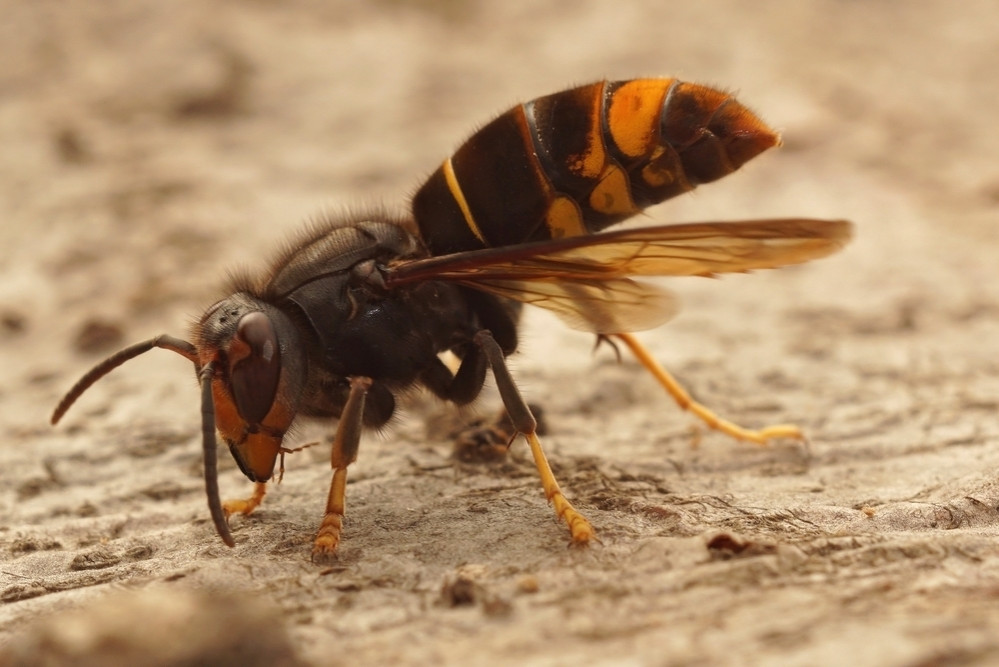
02.12.2025 Western Switzerland: Killer hornet eats bees
The territory of the Asian killer hornet has expanded considerably this year, with a notable increase reported in western Switzerland. This invasive species poses a significant threat to native bee populations, as bees make up the majority of its diet. The potential consequences are serious. Moreover, the hornet represents a danger to individuals with allergies to its venom.
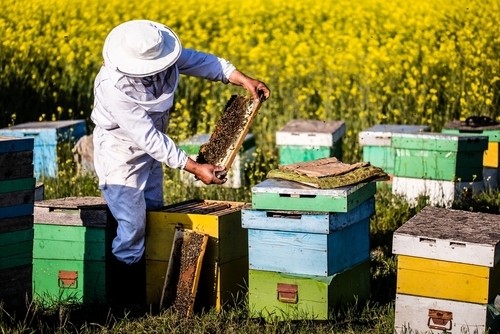
25.11.2025 Serious concerns about the bee population!
Asian hornets are inflicting significant harm on beehives across multiple parts of Europe, as reported by local beekeepers. Even a small number of hornets can destroy an entire bee colony within hours. This sharp decline in pollinators could have serious consequences for pollination, local ecosystems, and agricultural productivity.
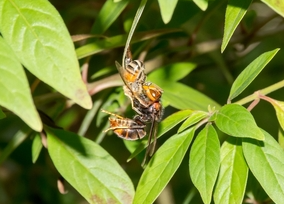
18.11.2025 Asian hornet doesn't just eat bees!
The danger it presents to insects is substantial!
The Asian hornet feeds largely on honeybees—up to 85 percent of its diet—alongside beetles and flies. This high level of predation not only poses difficulties for fruit growers but also further threatens already vulnerable bee populations.
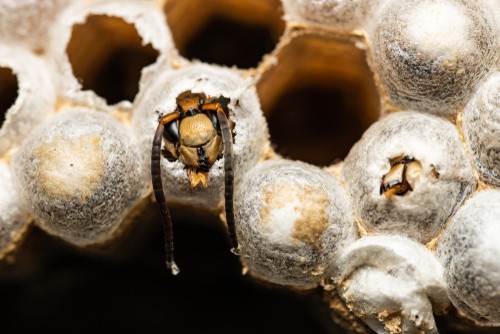
11.11.2025 How did the Asian hornet get to Europe?
The Asian hornet likely arrived in Europe unintentionally and has quickly expanded throughout France and nearby countries. Its adaptability to different environments and the absence of natural predators have contributed to its rapid spread. A single nest can generate several hundred new queens in one breeding season.
Asian Hornet Reporting Form
Please fill out all required fields and submit the form.
Help us!
If you discover an Asian hornet or a nest of this invasive species in Grüsch, it is of the utmost importance that you report it immediately. The Asian hornet is not only dangerous to humans, but also poses a serious threat to native bee populations and the ecological balance in Switzerland.
Why is it important to report the find?
Once established, the Asian hornet asserts a noticeable influence on native insects, honey bees bearing the brunt of this impact, within regions it has colonized. Through their predatory behavior towards bees, these hornets initiate a chain reaction that may lead to a decline in pollinator populations, thereby affecting the overall balance of local flora and agricultural productivity. By reporting sightings, experts can react quickly, remove the hornets or their nests and thus prevent the spread of this invasive species.
Notification form for sightings
Preserving the balance of our ecosystems and protecting our native insect populations requires your active participation. Please report any suspicions or sightings of the Asian hornet using our dedicated reporting form. Together, we can intervene at an early stage and minimize the impact of this dangerous species in Switzerland.
Your contribution is crucial in the fight against the Asian hornet in Grüsch. Together we can protect nature and maintain the balance of our ecosystems;
Thank you for your vigilant attention and your commitment to protecting our environment.
How dangerous is the Asian hornet?
The Asian hornet (Vespa velutina) is a predatory insect that originated in Asia and has spread in recent years to various parts of Europe, including France and now also Switzerland and in Grüsch. Although it poses a threat to honey bees and native biodiversity, it is generally no more dangerous to humans than other wasp species. Nevertheless, there are some aspects to be aware of:
1. Threat to honey bees: The Asian hornet preys on honey bees, threatening native bee populations. A decline in bees can have a negative impact on pollination and thus on local flora and agricultural production.
2. Stings: As with other wasp and hornet species, the stings of the Asian hornet can also be painful. For most people, the stings are unpleasant but not dangerous. However, people who are allergic to wasp or hornet stings can suffer a severe allergic reaction, which in the worst case can lead to anaphylactic shock.
3. Aggressiveness: Although the Asian hornet is not necessarily more aggressive towards humans than other wasp species, it can become aggressive if it feels threatened, especially near its nest.
4. Ecological effects: Apart from the direct effects on honey bees, the spread of the Asian hornet can also disturb the ecological balance by affecting the populations of other insects.
It is crucial to distinguish the Asian hornet from the Asian giant hornet (*Vespa mandarinia), which possesses the moniker "killer hornet." The size disparity between the two must not be overlooked, as the giant hornet's significantly larger dimensions and stronger venom, along with the size of its sting, give rise to greater potential danger to humans.
If you have discovered a nest, call us immediately: 058 510 22 54
Our hornet professionals in Grüsch are certified by the VSS.
Frequently Asked Questions About Asian Hornets in Grüsch
Possessing the potential to inflict stings capable of causing potentially severe or fatal harm, the Asian hornet surpasses the level of danger posed by most other hornet species.
Measuring up to 3 cm in length, the Asian hornet is a notable stinging insect distinguished by its slender, black body adorned with intense and captivating orange, yellow, and black stripes.
The Asian hornet's natural inclination is to be shy and passive, but its behavior swiftly changes to an active and aggressive mode when it senses a threat or feels cornered, prioritizing its defense.
It is essential to note the harmful effects of the venom carried by the Asian hornet, as it can cause painful bites and elicit allergic reactions in humans.
The Asian hornet's venomous sting is a cause for concern, as it delivers more pain than other wasps and may lead to allergic reactions.
To make a report regarding an Asian hornet, it is crucial to contact either a regional wild bee protection officer or an agency operating under the responsible Ministry of Agriculture.
It is significantly important to report instances of Asian hornets to avoid possible attacks and limit the spread of this highly territorial and aggressive insect.
In Switzerland, addressing the presence of Asian hornets requires professional hornet control measures. It is wise to call upon the resources of a pest control service for assistance.
The Asian hornet does not fall under protected species, highlighting the importance of closely monitoring their population to limit their distribution.
During hibernation, Asian hornets follow either a collective or solitary pattern: they either hibernate together in groups or take refuge alone in wall corners, buildings, garden sheds, chance houses, or tree hollows.
Would you like more information about Asian hornets? Then take a look at our FAQ's about Asian hornets.
Private inquiry form
For an uncomplicated request to remove an Asian hornet's nest, please use our contact form for private individuals.
Real estate inquiry form
Use our property management order form to request the removal of an Asian hornet's nest.




_16.jpeg)
_14.jpeg)
_13.jpeg)
_13.jpeg)